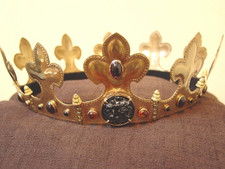Difference between revisions of "Regalia"
From AmtWiki
| Line 1: | Line 1: | ||
===Noun=== | ===Noun=== | ||
regalia (plural only; not used in singular form) | regalia (plural only; not used in singular form) | ||
| − | [[Image:Drach1.thumb.jpg| | + | [[Image:Drach1.thumb.jpg|thumb]] |
*royal rights, prerogatives and privileges - actually enjoyed by any [[sovereign]], regardless of his [[title]] ([[emperor]], [[grand duke]] etcetera) | *royal rights, prerogatives and privileges - actually enjoyed by any [[sovereign]], regardless of his [[title]] ([[emperor]], [[grand duke]] etcetera) | ||
*the emblems, symbols, or paraphernalia indicative of [[royalty]] or any other sovereign status; such as a [[crown]], orb, Necklace of office, scepter, [[sword of justice]] | *the emblems, symbols, or paraphernalia indicative of [[royalty]] or any other sovereign status; such as a [[crown]], orb, Necklace of office, scepter, [[sword of justice]] | ||
Latest revision as of 07:10, 17 February 2009
Noun
regalia (plural only; not used in singular form)
- royal rights, prerogatives and privileges - actually enjoyed by any sovereign, regardless of his title (emperor, grand duke etcetera)
- the emblems, symbols, or paraphernalia indicative of royalty or any other sovereign status; such as a crown, orb, Necklace of office, scepter, sword of justice
- decorations or insignia indicative of an office or membership of an order or society; such as freemasonry
- finery or magnificent dress
Etymology
From Latin regalia, neuter plural of regalis (“of a king”), from rex.
